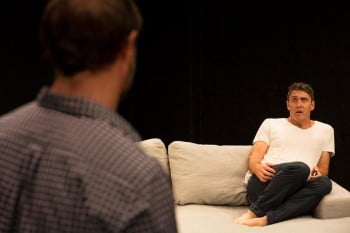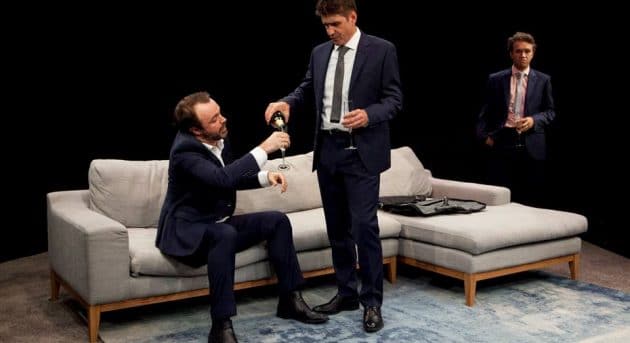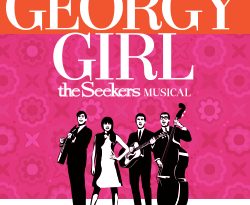Replay – Griffin Theatre Company
Replay, a small and surprisingly ambitious new play by Philip Parsons Playwriting Award winner Phillip Kavanagh, studies the way a single decision can make, or break, a life.
Three brothers, Michael (Jack Finsterer), John (Alfie Gledhill), and Peter (Anthony Gooley), experience a significant trauma. Years later, when trying to remember the exact details of this formative, devastating event, something strange happens – changing their lives more than they could have imagined. This is a vague description, but explaining the specifics of the event or the change that the brothers go through would spoil the plot entirely, and the great fun of this play is its sense of surprise.

Kavanagh deftly employs the tight, spiralling logic typical of science-fiction to his family drama, challenging the audience to consider the murky waters of action, reaction, and consequence that stem from every choice. Replay flings up the flavour everyday clichés and references – think “there but for the grace of God go I” and Tennyson’s “Theirs not to reason why, theirs but to do and die” – and challenges its audiences to plow past these pat explainers of choice and outcome to consider our own agency and accountability.
On top of that, Kavanagh tests the memory of his characters in quiet, unsettlingly recognisable ways: they stumble over their recollections, they correct each other’s mistakes, they forget what actually happened and confuse it for the more palatable story (the lie) they had prepared for others. Truth is a slippery thing, and so is remembrance, and so is the shape of a life: with one different belief, everything around you could change. It’s an intimidating thought, but in Kavanagh’s hands there is still room for lightness and levity. His well-intentioned gay panic jokes invoke more of an eye-roll than a chuckle, but other laughs land more successfully; confusion over a character’s home and their leaking roof, tame as that sounds, is a genuinely funny highlight in context.
Replay also asks us to consider these questions and concepts outside the confines of a living room, outside the bond of family. In his program note, Kavanagh says he sees his play as a consideration of memory in the collective; for example, he cites January 26 being Australia’s ongoing day of celebration despite it being a date that marked an invasion and astonishing number of atrocities. The play doesn’t quite engender these larger questions, but the similarity is certainly there to be drawn; a look at the more understandable, smaller-scale situation.

Lee Lewis’ production is small and sensible, though perhaps a little too sensible for the script – a sudden change of character is confusing; the change is initially and perhaps unintentionally indistinct (the script suggests this change should be immediately recognisable), and since the play already has a tenuous relationship with linear reality, the shift is a jarring one. The impact of these new characters is almost missed as the audience recalibrates.
Our trio – Finsterer, Gledhill, and Gooley – play together like siblings, with a keen understanding of those fine family lines between teasing and torture, and vulnerability and defensiveness. Finsterer is looser than the other two by design; Gledhill carries his sadness in eyes; Gooley keeps his somewhere in his shoulders, and the tension in his jaw. They are trying to hold onto the things they know about each other; they are trying to learn new things about themselves. It’s a careful dance.
Kavanagh’s voice as a writer is sharp, curious, moving with confidence on a spectrum from playfulness and gravity, and there’s a refreshing sense of idealism that might be familiar with comics or high-concept sci-fi novels, but he never loses sense of where he is and who he’s writing about. The play might feel a little messy, a little too empty too meet its lofty written goals, but it’s constantly engaging, and it feels very fresh.




